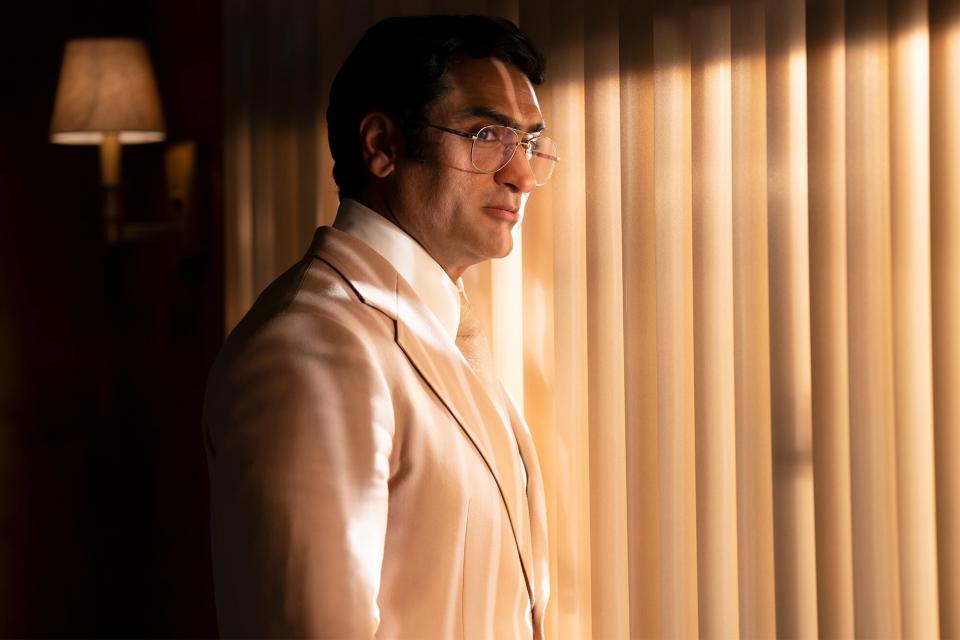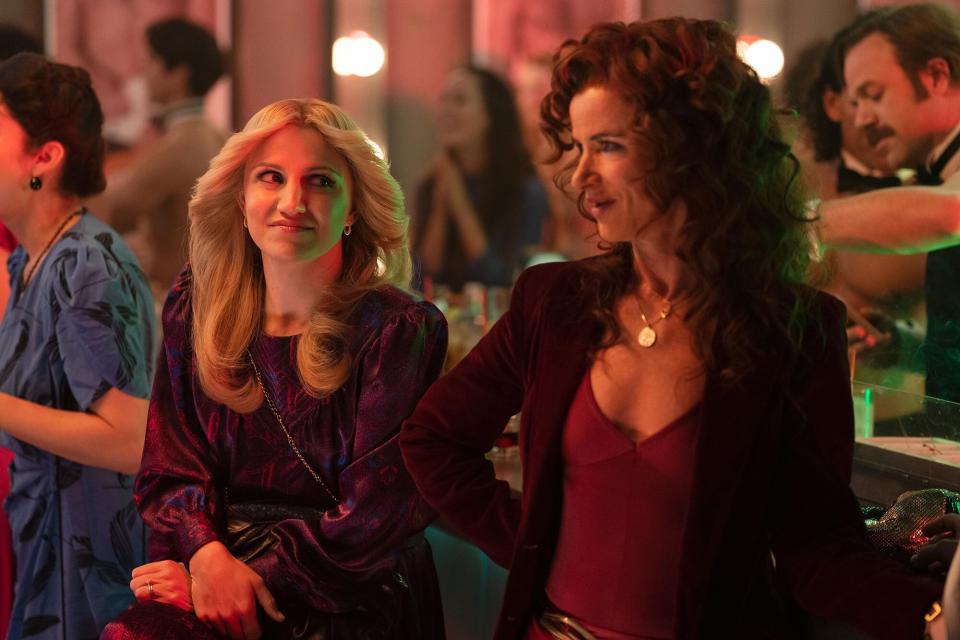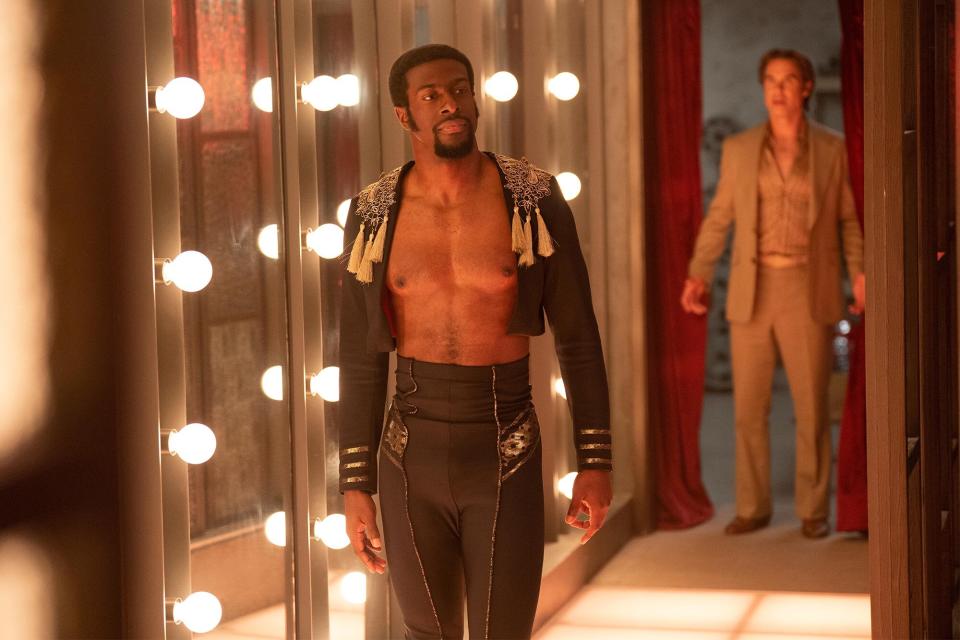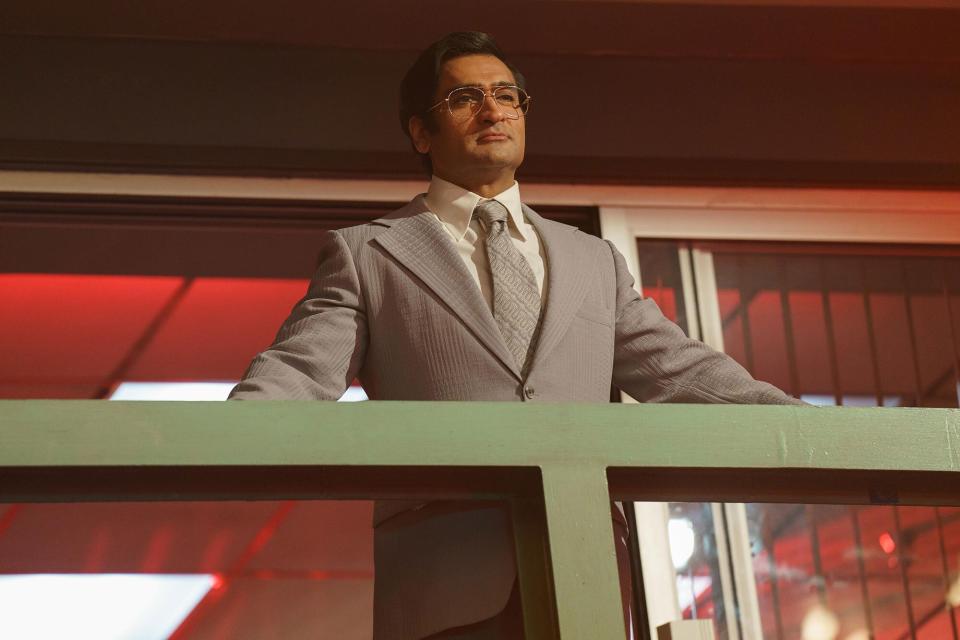Welcome to the dark side of the American dream: Kumail Nanjiani breaks down Chippendales ' final scene
- Oops!Something went wrong.Please try again later.
- Oops!Something went wrong.Please try again later.
- Oops!Something went wrong.Please try again later.
WARNING: This post contains spoilers from the finale of Welcome to Chippendales.
The American dream turns deadly in Welcome to Chippendales, Hulu's true crime series that tells the story of entrepreneur and Chippendales founder Somen "Steve" Banerjee.
Kumail Nanjiani (Eternals, The Big Sick) takes a dark and compelling turn as Banerjee, the gas station attendant turned founder of male striptease dance troupe Chippendales. Creator and showrunner Robert Siegel's (Pam & Tommy) eight-episode miniseries tracks the rise and fall of the entrepreneur, who was charged with the murder of his business partner Nick De Noia (Murray Bartlett), as well as murder-for-hire and racketeering in 1993 related to allegations that Banerjee took deadly means to wipe out Chippendales competition.
As depicted in the finale, out on Hulu now, Banerjee took his own life in his jail cell in 1994, a day before he was set to be sentenced. For Nanjiani, the story needed to be told "because it gets to the heart of the myth of the American dream" — namely, the unsustainable idea that "no amount of success is enough." Below, star and executive producer Nanjiani and showrunner Siegel speak to EW about bringing the crazy true story to the screen, that symbolic final sequence, and more.

Erin Simkin/Hulu Kumail Nanjiani as Steve Banerjee in 'Welcome to Chippendales'
What was it about the story of Steve and Chippendales that resonated with you?
ROBERT SIEGEL: As a writer, it checked my boxes. I look for things that are really fun and wild and trashy and often real life, that also offer the opportunity to say something, that have resonant themes. I like things that at first blush, maybe you underestimate and you think this is just going to be kind of a trashy good time, and then it kind of sneaks up on you that the thing, the TV show or the movie, has something more on its mind. I hope that was the case with both Pam & Tommy and this, where you have these wild tabloidy stories of murder and sex tapes, and you find that there are things being said about capitalism and second wave feminism and racism and all the isms. So that's what attracted me to it. I thought it was really fun and substantive.
KUMAIL NANJIANI: I've never gotten the chance to play a character like this, someone who sort of goes so dark and changes so much over the course of the season. And I thought that the story itself was so wild and unpredictable and sort of shocking that I felt like I had to be a part of it. I thought of someone else playing this part and the show being great and how upset it would make me, and then I decided to do it.
You've got a fascinating true crime subject, because there's not a lot of public information available about Steve other than his trial and death. What did the research process look like, and did you reach out to anyone within his circle?
SIEGEL: It would've been great if there was some treasure trove of interviews with Steve and his wife and Nick. Our main characters, there just weren't a whole lot of interviews out there with them. It's not like they were super famous, so we just got our hands on as much as there was. There was a series called, I think, Curse of the Chippendales, which I think came out around the time of our writer's room. It kind of confirmed that there wasn't anything more than what we had found, which makes it challenging, but it also offers an opportunity. You're not as hemmed in. You can create a more original character. We did not [reach out to anyone in his circle]; he has a son Christian, who is a male stripper. It's an interesting little footnote on the whole thing. We didn't reach out to the family. Obviously, most of the main players in the whole thing are dead. Irene passed away.

Jessica Brooks/Hulu Annaleigh Ashford as Irene and Juliette Lewis as Denise in 'Welcome to Chippendales'
Kumail, the role diverges from your comedic roots. What were some of the challenges, if any, of playing an anti-hero?
NANJIANI: I've never played a part where I wasn't asked to be funny at all. That's still where I feel most comfortable and I've traditionally gained success by whether I'm being funny or not. So that was the challenge: how do I gauge how I'm doing if I'm not being funny? And how do I make audiences sort of connect with this guy if I don't have the humor? That was my biggest sort of challenge going into it.
SIEGEL: I've heard him talk about how one of the things that scared him about the character was he didn't know how to use his usual kind of bag of tricks. He didn't know how to be funny as this character, because the character is sort of humorless. But as we shot it, it was clear that he did find a way. He's really funny in the role, it's just kind of a different gear than what he is used to. But I just think he's a tremendous actor. I've always loved his work and I'm definitely partial to comedians. I always think standup comedians make great dramatic actors. There's often a real depth and there's a lot to mine, I think, with funny people.
I think for immigrants or children of immigrants, our perceptions of Steve — who started out as a gas station attendant who dealt with racism — will be a bit different from those unfamiliar with that immigrant experience. How much of Steve's story did you internalize while working on this?
NANJIANI: It was very important that I did not take any of him home with me. For me, that was something I was very wary of going into [the series]. I wasn't going to be method or anything; I still wanted to live my life. I found the challenge sometimes wasn't getting into the emotion of a scene, it was getting out of the emotion of a scene, because the body doesn't know the difference. If I'm doing a scene where I'm angry or sad, my body doesn't understand that it's just acting, and [that] when we yell "cut" my heart rate should go down and I should stop sweating. It doesn't really know that. I sort of understood as things started getting really intense on the show, I was like, "I can see myself staying with these feelings and emotions. I want to be able to cut them off when I need to cut them off." And I talked to Emily [V. Gordon, wife and executive producer on the series] about it too, because I was like, "I want to come home to you and not be stuck in the Steve mode." So that was something I was very, very intentional and thoughtful about: not bringing the feelings home with me.

Erin Simkin/Hulu Quentin Plair as Otis and Murray Bartlett as Nick in 'Welcome to Chippendales'
The series examines racism within marginalized communities through the lens of Steve's relationship with Otis (Quentin Plair). What kind of conversations were had with Quentin about bringing that dynamic to the screen?
NANJIANI: We talked about racism a lot. By the way, [Plair] is so, so good in it, and he invested so much in it even though you don't see much of that relationship on camera. I think his reaction to what he sees as Steve's betrayal, which really is betrayal, really fills in a lot. You really see how much he looked up to Steve. So his performance really does so much for us there. For me, it was interesting to explore racism coming from a non-white party. In America, on TV, we're used to seeing white people be racist, but seeing non-white people be racist is something that isn't common at all. It might make people uncomfortable, but the truth is, racism is a problem in other cultures and other countries as well.
It was exciting to be able to explore that a little bit, because I was here after 9/11 and I had people who were racist to me openly on the street or at comedy shows. Not all of them were white, [which was] shocking to me. I thought, "A group that's been marginalized should have more empathy towards another group that's also been marginalized." And so, to explore that a little bit, I knew that it was sort of a messy and complicated thing to get into, but it's important.
SIEGEL: Steve, when he came to America, he equated success and class. To be a big American, he equated success with being white, and he really kind of wanted to be white. . . I thought that was one of the really interesting things about it, is here you have a guy who's simultaneously a victim of racism and then perpetrating it. I don't think he saw himself as racist. I think he saw himself as doing whatever was necessary to make money. If he could have made more money letting in people of every color and creed, he would've in a heartbeat. He was very pragmatic and just saw everything in terms of green.
Let's talk about that finale. While awaiting trial, Steve dies by suicide in his jail cell. It then flashes back to the original Chippendales club in Los Angeles, where Nick is alive and Steve is making the rounds and admiring his empire. What was the intention behind this final sequence?
SIEGEL: From a pragmatic standpoint, it's not ideal to end your show on a guy hanging dead in a jail cell because it's a bummer. But thematically, I think what you're doing by flashing back is you're landing on that moment when maybe things were perfect and if he had just left it alone. The club is a success. Everyone's there, thriving and alive. As that tracking shot moves through the club, you see Otis is there. Otis and Nick and Irene and all that. If he just could have said to himself, "Okay, this moment is perfect. Just preserve this, keep this going," everything would've turned out completely different.
One of my inspirations was a movie called Longtime Companion. It's a movie set during the AIDS crisis in the '80s, and by the end of the movie, basically almost everyone is dead. And then it ends with this kind of dream fantasy sequence where the one surviving person is standing on the beach. Then everyone comes back and they have this big party on the beach with all these people who've died, who were wiped out by AIDS. It's really, really emotional, so that was definitely something I was thinking of. We went through a lot of different endings. I probably wrote 10 different final five pages.
NANJIANI: It's so bittersweet. It's almost hard to watch, because we've seen these people go through so much. Seeing them alive again, happy, it's almost painful to watch in a good way. Thematically, it really speaks to the show, because it's like, this is what he had. If this was enough for him, everything would've been okay. But this wild success wasn't enough for him. He wanted more. That really speaks to the themes of the whole show. It's a beautiful shot. Richard Shepard designed that shot. It's a camera on a crane, it comes off a crane, it goes back on a crane, it comes off a crane, it goes back on a crane. So it's a really, really complicated shot with a hundred extras and us moving around and all this stuff. The emotions of that scene really hit me because Steve's bringing a Coke for Irene, and we're just reminded of the first night sharing that Coke. So to me, it really, really drives home the point of the show, which is enough should be enough.

Erin Simkin/Hulu Kumail Nanjiani as Steve in 'Welcome to Chippendales'
True crime adaptation can be tricky; there have been conversations lately surrounding some recent TV offerings in terms of exploitation, rehashing trauma, etc. What do you hope to convey to audiences with Chippendales?
SIEGEL: I don't like grizzly exploitative stuff, I like stuff that gives you an opportunity to do character studies. It's really Steve's story in the end. Kumail was reluctant to play this role because he didn't want to play, as I've heard him put it, a brown guy who's bad. He's talked about it in interviews. He uses the phrase "tyranny of representation," where he doesn't want to feel like beholden to upholding this myth of the model minority. He came to see value in playing a bad guy who's brown, because so often Asian and South Asian, on the rare occasion that they are the lead in something, it's rare that they're like . . . a bad guy, because they're always math nerds and just perfect upstanding law abiding people, which I think is reductive and one-dimensional-izing. But yeah, I mean, exploitation is not in any way the goal of the thing. For a show with murder, it's not like it's particularly gory. I would say the average episode of CSI has way more gore. The murder is just kind of a means to an end. It's really about the relationships and exploring who these people are and what makes them tick.
NANJIANI: I'm not a true crime person. It's not a genre that I watch all the time. For me, the story was worth telling because it gets to the heart of the myth of the American dream. There's this idea that you can come from anywhere in the world, anybody can come here and be what they want to be, but that's not true. Access to success is different based on where you're from, what you look like, what your name is, what you sound like, who your parents are, all that kind of stuff. And also this idea that no amount of success is enough. I think that's definitely how success is perceived in America. You just have to get bigger and bigger.
You look at corporations, if they stay the same size, that's bad. You're supposed to grow every quarter. I think people internalize that and apply that to their own lives too, where they think, "I need to be more successful than I was last year." Well, that's kind of unsustainable, unrealistic, and a mentally unhealthy way of living your life. You're always looking forward to something that you don't have yet. So for me, the reason for doing the show were these two things: exploring what success means in America, and especially what success means in America to someone who's not from America.
This interview has been edited and condensed for length and clarity.
Welcome to Chippendales is now streaming on Hulu.
Sign up for Entertainment Weekly's free daily newsletter to get breaking TV news, exclusive first looks, recaps, reviews, interviews with your favorite stars, and more.
Related content:

